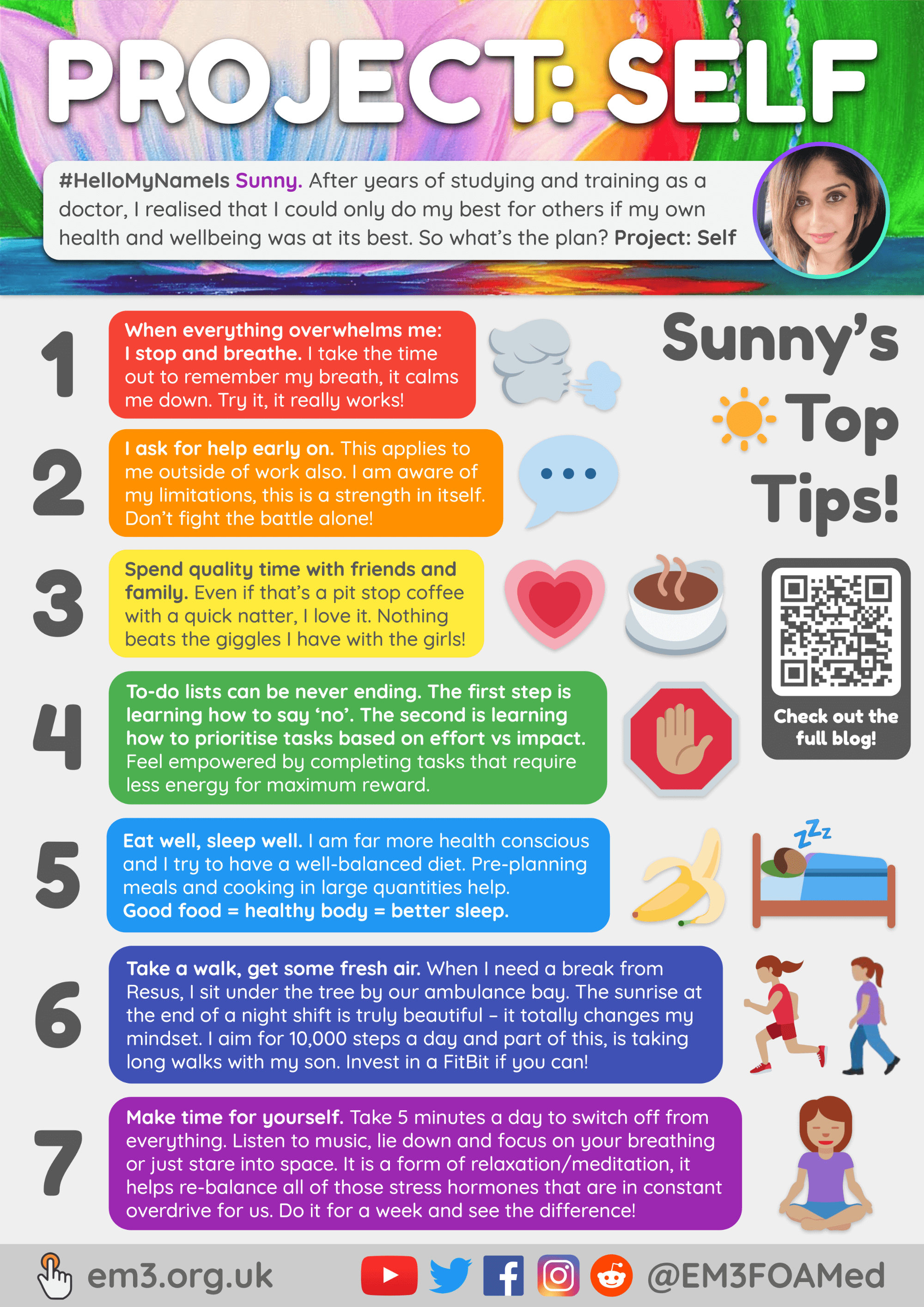Project: Self
"#HelloMyNameIs Sunny. I’m currently working as a Senior Registrar and Educational Fellow for the LRI Emergency Department."
After years of studying and training as a doctor, only a few years ago, I realised that I could only do my best for others if my own health and wellbeing was at its best.
I think the hardest thing to do is to look after yourself first and foremost. Consistency is the key.
So what’s the plan? Project: Self.
The Reality
We work in a high-pressured, high-stakes environment and are always striving to perform well. We used to talk about ‘winter pressures’, but many of us will say…
“‘It’s busy all year round, any time of the day, any day of the week.’”
Team members try to do their very best for the patient in the most difficult of circumstances, but feel that more could have been done and are often self-critical.
So how does this affect us on an individual level? Do we consider this? If you ask me, I don’t think we do…
Constant ‘high adrenaline’ mode…
In 2015, Mind launched a Blue Light programme targeted at staff members working in the emergency services across England and Wales. The aim was to improve the Mental Health and well being for these individuals. The report highlighted some interesting facts, of which the ‘high adrenaline’ mode resonated with me.
In the Emergency Department we are working at high speeds and making quick decisions where adrenaline levels are through the roof. I’m sure many healthcare workers will have experienced something similar to me. When I walk through my front door after an intense shift I have no energy and even the simplest of decisions such as, ‘What shall we have for dinner?’ seems mind-boggling. This kind of decision fatigue often leaves you feeling drained.
The Balance
Literature often talks of ‘work-life balance’, but in my opinion, it’s far more complex. Often we are juggling many things simultaneously or in parallel and the to-do list never ends. Many people have long-term commitments such as family, friends or hobbies they wish to pursue. How does this influence our performance in the workplace? More importantly, do we appreciate the impact it has on ourselves?
The Mind Body Soul Concept
The penny dropped for me after the birth of my son in 2016. Working at a high pace for many years really did take its toll and I hadn’t realised the impact it would have on me. This is a true reality and having studied literature on this topic since then, I have tried to make small yet consistent changes to improve my quality of life. Now I can honestly say that I am a much calmer, happier version of myself. So what does this mean for you?
A healthy mind = a healthy body = a healthy soul. There is a strong interconnection between these three aspects and any imbalance with one will have a knock-on effect to the others. Many studies have investigated how the complications of stress, particularly over long periods of time, can impact negatively on the nervous system. When the body is undergoing high levels of stress, this results in a surge of hormones to be released as the body prepares for the ‘fight or flight’ response (e.g. adrenaline, cortisol). In the Emergency Department we are constantly working at this level, and this is just one side effect of our work. There are lots of strategies to combat the stress response, but this can vary from person to person. However, here are just a few of my personal favourites you might like to try…
Sunny’s Top Tips ☀️
When everything overwhelms me, I stop and breathe. I take the time out to remember my breath, it calms me down. Try it, it really works!
I ask for help early on. This applies to me outside of work also. I am aware of my limitations, this is a strength in itself. Don’t fight the battle alone!
Spend quality time with friends and family. Even if that’s a pit stop coffee with a quick natter, I love it. Nothing beats the giggles I have with the girls ☕️
To-do lists can be never ending. The first tip is learning how to say ‘no’. The second is learning how to prioritise tasks based on effort vs impact. You will feel much more empowered completing tasks that require less energy for maximum reward.
Eat well, sleep well. I am far more health conscious and I try to have a well-balanced diet. Pre-planning meals and cooking in large quantities help. It improves energy levels, as well as improving your quality of sleep. Try it out 👩🏽🍳
Take a walk, get some fresh air. When I need a break from Resus, I sit under the tree by the ambulance bay. The sunrise at the end of a night shift is truly beautiful from there – it totally changes my mindset. I aim for 10,000 steps a day and part of this, is taking long walks with my son. Invest in a FitBit if you can!
Make time for yourself. Take a minimum of 5 minutes a day to switch off from everything around you. Listen to music/podcast, lie down and focus on your breathing or just stare into space. Whatever that 5 minutes might be for you, please try it. It is a form of relaxation and meditation, it helps re-balance all of those stress hormones that are in constant overdrive for us. Do it for a week and see the difference 🧘🏽♀️
Let’s Keep Moving Forward!
I hope you’ve enjoyed reading my blog. I’d love to hear from you, even if that’s a quick chat in the corridor. If you’d like to share your ideas and think of ways to encourage wellbeing in the Emergency Department, please let us know in the comments section below!
Recommended:
- The 4 Pillar Plan (Dr Rangan Chatterjee)
- ‘Sink or swim?’ Improving the mental health of staff in hospital emergency departments (MIND)
- Understanding Brain, Mind and Soul: Contributions from Neurology and Neurosurgery (Sunil K. Pandya)
- The Future of Psychology: Connecting Mind to Brain (Lisa Feldman Barrett)
- The impact of stress on body function: A review (Habib Yaribeygi et al.)
- Things I wish I’d learnt before Emergency Medicine and Parenthood (RCEM Learning)
- Web & mobile app for meditation and sleep (CALM)













